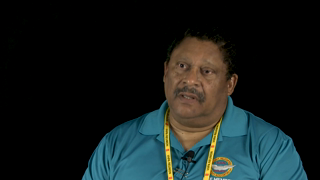3:12 | He was a rebellious teen and in those times, rebellious teens were encouraged to join the Army, so he did. Barry Purnell was headed to West Point Prep School, but he left to get married and was posted to Korea. After he rotated home, he went to Officer Candidate School and then flight school, which punched his ticket for Vietnam.
Keywords : Barry Purnell Philadelphia PA Fort Jackson Korea Republic of Korea (ROK) Korean Augmentation To the United States Army (KATUSA) Officer Candidate School (OCS) Fort Benning flight school Vietnam

The base was an old Japanese airfield in South Vietnam's southern delta. It was more comfortable than the field and Barry Purnell even bartered for an air conditioner for his room. The helicopter pilot was first assigned to ferry troops, but then he was bumped up to the Armed Platoon, which flew gunships to protect the insertions.
You developed a sixth sense, according to helicopter gunship pilot Barry Purnell. Anything out of the ordinary below could be the enemy. He supported South Vietnamese troops and their advisors, protecting the ships which ferried the troops. He offers an explanation of the Viet Cong psyche and he laments the upper hand given the enemy by our own policies.
He had been an infantry officer, so Barry Purnell really appreciated the difference in living conditions once he became an aviator. He flew a helicopter gunship supporting South Vietnamese troops down in the southern delta. His longest mission was an insertion into Cambodia, which went surprisingly well.
His daily life included letters written home like most soldiers, but helicopter gunship pilot Barry Purnell was able to keep a stereo in his quarters and cook food he acquired from various sources. The life of an aviator has it's advantages. When he was really lucky, he got to eat Navy chow.
He never took R&R while he was in Vietnam and he kept busy flying right up until he rotated home. Barry Purnell explains his logic and then he reveals an odd request he made of his father to prepare his homecoming. He brought home no demons from the war, but he did share in the ill treatment by an ungrateful public.